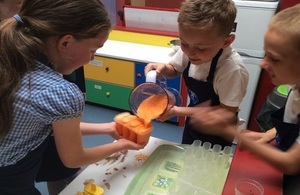Washingborough Academy
Washingborough Academy uses locally sourced, seasonal ingredients where possible, growing as much food as possible in its grounds.

Image copyright Washingborough Academy
With 300 pupils aged 3 to 11, the school has its own allotments and raised vegetable beds where children grow their own food as well as a Heritage Orchard with 22 varieties of apple. A new beehive allows honey to be produced on site and a pizza oven means that children can make fresh pizzas with produce from the allotments. Children take part in at least an hour of food education every week and the school is planning to host a food conference to share knowledge and experience with other schools in the area. The school currently hosts an annual farmers’ market of local food suppliers.
Washingborough has a ‘Cooks Club’, which uses fresh produce from school allotments and looks at the provenance of food. The school employs its own chef and produce gardener who run teaching sessions and use the school’s kitchen garden herb wheel during cooking lessons and in the school kitchen. The Children’s Kitchen allows local groups, including the local Children’s Centre, to run parent and child cookery sessions for families.
A ‘Food Glorious Food Cooking Scheme’ teaches children cooking skills and growing methods, and regular updates are posted on social media. These feature the school’s local and organic meals, sharing recipes learnt at school where parents can see what’s on offer and recreate recipes at home with their children. The school’s own Youtube Food Channel allows children to share their cooking experience and a monthly blog details all the school’s cooking and growing activities. Year 6 children are taught 10 ‘essential’ meals to be able to cook on their own, such as bread, shepherd’s pie and leek and potato soup.
Headteacher Jason O’Rourke said:
For a small financial outlay to get our projects going, we are receiving so much more back: the engagement of the children and the wider community, selling our produce to the parents/grandparents. We have a weekly snack shack that more than covers its costs and allows children to make healthy snacks to sell in school, and the ‘profits’ we make from our initiatives are then used to fund further healthy eating initiatives and projects.
The school is about to start an international partnership called ‘Read, Write, Eat’ with schools in Poland and Slovenia based around cooking and local cultural stories.
But it’s not all about food. The academy has been awarded the Sustrans Gold School Mark and is a keen participant in Sustrans annual Big Pedal competition, which encourages the school community to cycle or scoot to school. They have their own ‘fleet’ of mountain bikes and have weekly mountain biking lessons for key stage 2 children.